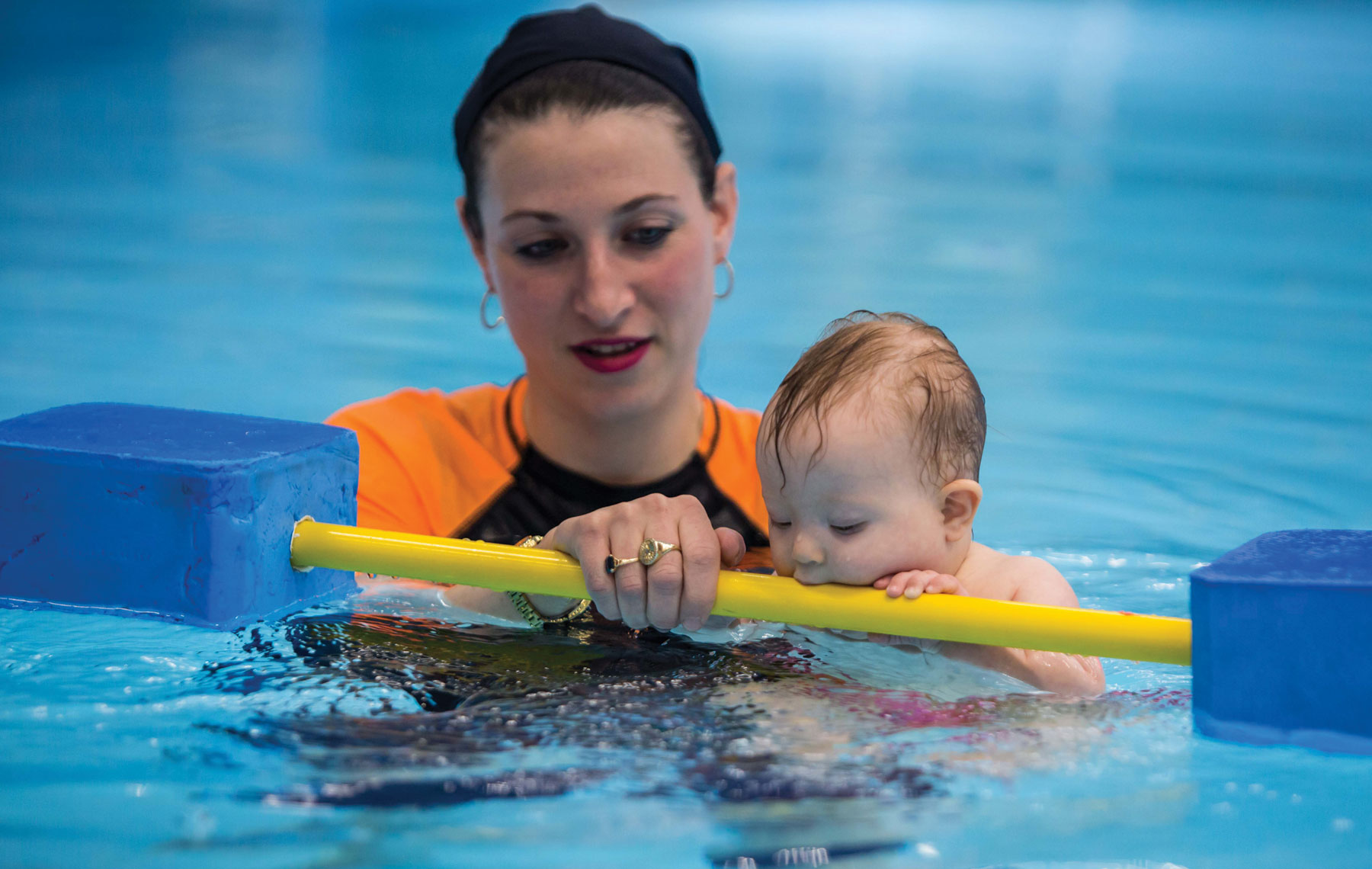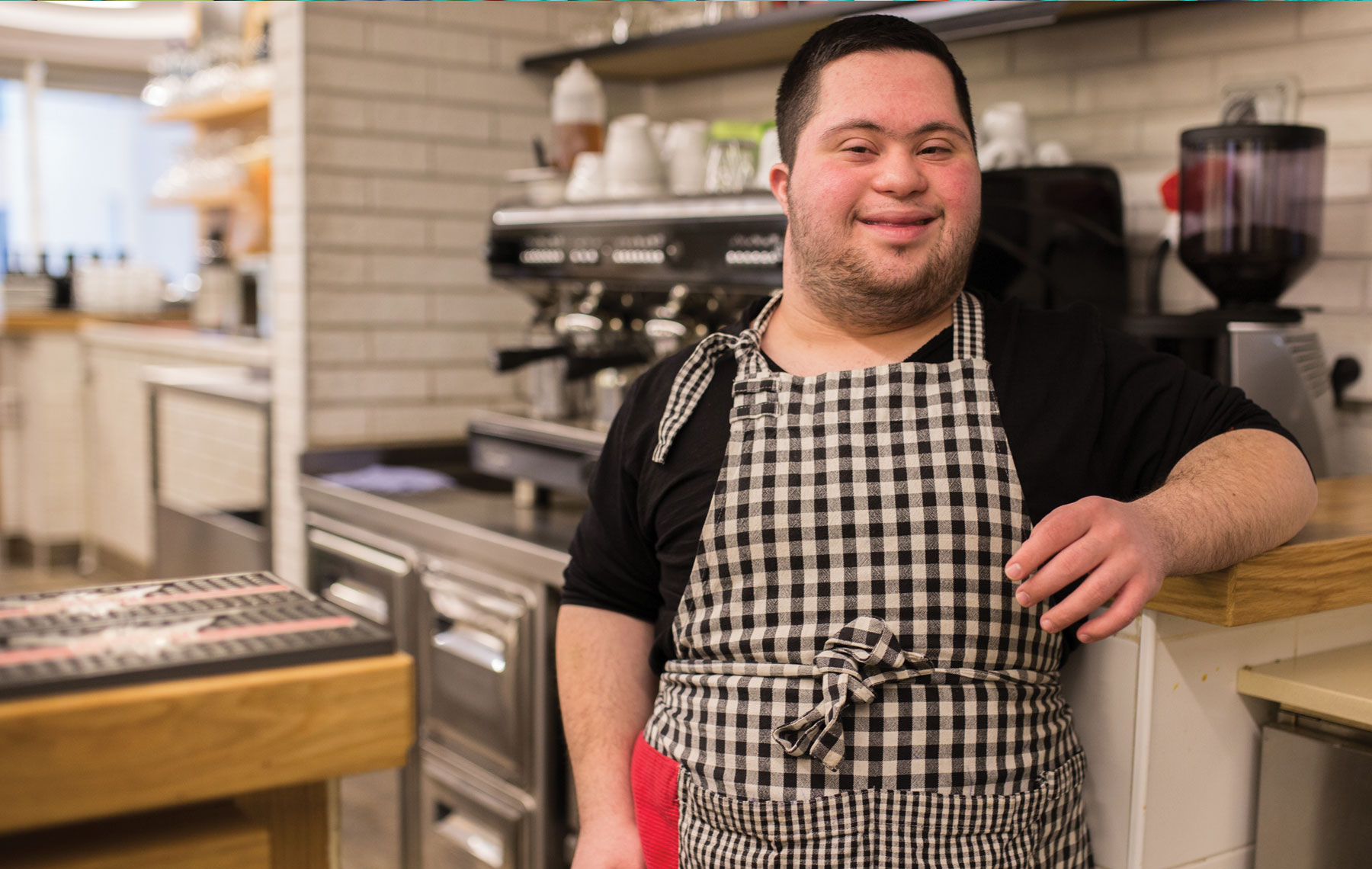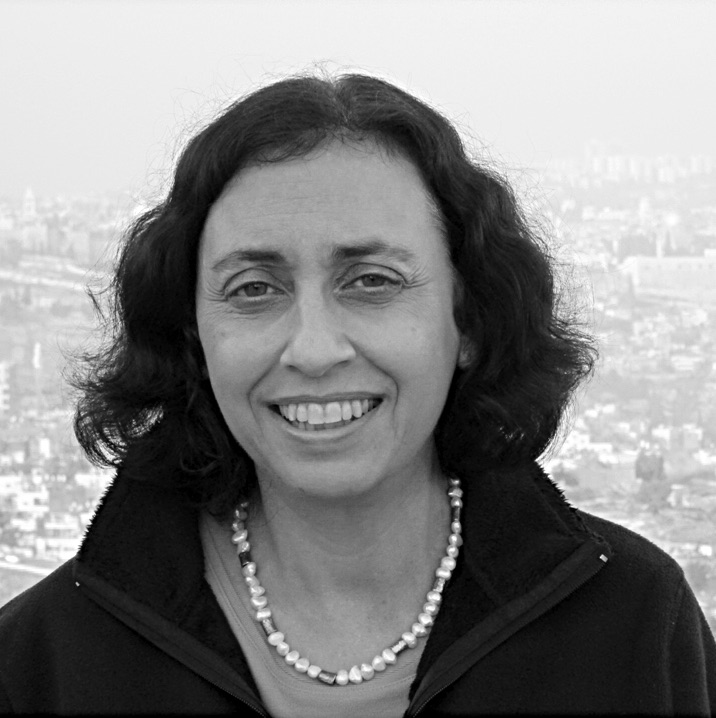 Photos courtesy of Shalva
Photos courtesy of Shalva When Sara gave birth to her second child last October, she was surprised to learn that the newborn — her daughter, Lily — had Down syndrome.
“I didn’t know during the pregnancy, so it took time to learn about the condition,” said the 30-year-old Israeli mother, who lives in a coastal city in central Israel. “At the time, I didn’t know anyone with Down syndrome or what it entails.”
Although Sara and her husband could have spent months searching for the therapies Lily needs to reach her full potential, they learned about the Shalva National Children’s Center in Jerusalem while still in the maternity ward.
When Lily was 3 months old, Sara began to commute to Jerusalem to participate in Me & My Mommy classes, part of a once-a-week therapy and training program for parents and their children, from newborns to 1 1/2 years old.
“It’s amazing,” Sara said. “You have a hydrotherapy session, physiotherapy, speech therapy, and as a mother you learn the therapies so you can do them the rest of the week.”
She also appreciates the support she gets from other parents.
“There’s an amazing group of mothers in the same situation as I am,” Sara said. “There’s always a 45-minute break, so we mothers can sit and talk together at the same time.”
Once a month, parents are invited as a group to speak to a social worker while the staff cares for the babies. “We have a chat, the social worker asks certain questions to learn how we’re doing,” Sara explained. “Every mother has the opportunity to share.”

For Sara, the drive to and from Shalva can take up to three hours round-trip, “but it’s worth it,” she said. “I know a couple that comes to Shalva from Tiberias [in the north] every Sunday. In fact, they’re moving closer to Jerusalem to be closer to Shalva.”
Founded by Kalman and Malki Samuels in 1990, the nonprofit Shalva organization provides a range of therapeutic and educational services to 2,000 infants, children and young adults with developmental disabilities or delays, autism and other conditions.
All services are provided free of charge and are offered on a first-come, first-served basis. Government ministries usually make the referrals. The children come from every socioeconomic, religious and ethnic sector of Israeli society and sometimes beyond.
“We’ve had United Nations employees who chose to work in Israel because of Shalva,” said Meira Brandwein, a development executive for the organization, as she gave a tour of the center. “We’ve also had individual parents, government officials and university students come to us from around the world to learn from us and bring the tools back to their own countries.”
The Samuels, an Orthodox couple, launched Shalva several years after their son Yossi became deaf, blind and extremely hyperactive after receiving a tainted vaccination shot for diphtheria, pertussis and tetanus. Like Helen Keller prior to her breakthrough with Anne Sullivan, Yossi was deeply frustrated and isolated by his inability to communicate.
“Malki vowed to HaShem that if he found a way for Yossi to connect with her and the world, she would devote her life to helping other parents of children with disabilities,” Kalman Samuels told the Journal.
“You have to get used to a new reality when you have a child with a disability.”
— Sara, Shalva mother
Shalva started in a small rented apartment and grew exponentially over the years, as parents and government ministries struggled to find the right services for children. In 2016, the organization moved from its bustling but cramped headquarters into a new $60 million building that is as beautiful as it is functional.
“We included all of the features, all of the services parents of children with disabilities hope and dream of for their children,” Samuels said.
Prior to entering the building, visitors encounter two brightly colored playgrounds that can accommodate dozens of children at a time, and a heartwarming sculpture of children at the center of a traffic circle.
Brandwein said the sculpture, which depicts a person surrounded by other people, exemplifies Shalva’s mission of enabling families to raise their disabled children at home, in the heart of society. “It signifies a child being raised by an entire community, surrounded and embraced by the world,” she said.
The atmosphere inside the center is equally welcoming and intentionally designed to not give off institutional vibes. The atrium in the building’s lobby “bridges the inside and the outside. Our children are part of the larger community and the community is part of us,” Brandwein said.
Every wall of the building’s lobby was designed to inspire shalva, the Hebrew word for serenity and tranquility. One wall is filled with photos of Shalva children interspersed with the words “Peace,” “Faith,” “Dignity” “Love” and “Inclusion” in Hebrew and English. Another wall bears a verse from Psalms 122:7: “May there be peace within your walls, Shalva, serenity within your places.”
Unlike the long corridors that dominate most major health institutions, the Shalva building has five airy pavilions and clusters of rooms and offices. In addition to numerous therapy rooms, the 11-story building offers an art room, a music studio, hydrotherapy pools, a well-equipped gymnasium, an auditorium, Snoezelen multisensory therapy rooms that help reduce agitation and anxiety, an attractive restaurant that provides training and employment to adults with disabilities, and a disability-friendly oral health clinic — one of only a handful in the country. In the summer, hundreds of children attend Shalva’s summer camp.
Ori Sasson, an Israeli Olympic judoka, created a rehabilitative judo program at Shalva, and partially funded it by auctioning off his uniform. The building also functions as a community center that hosts educational workshops and seminars, which help fund the building’s maintenance and the organization’s programs.
“You can see how far they have come. They are a living testament to what children with disabilities can achieve.” — Malki Samuels
Shalva was also designed to be an emergency response center at times of national crisis. It can double as a bomb shelter for up to 1,200 individuals, including overnight.
The need for such a structure became apparent during Israel’s 2014 war with Hamas in Gaza, when hundreds of thousands of Israelis were forced into bomb shelters, the vast majority of which weren’t accessible to people with disabilities.
While the building has many uses, its main objective is to be comfortable and welcoming to the children and young adults it was built to accommodate. An artist spent six months painting murals of animals, castles and other child-friendly images on every floor.
There is an entire floor with respite apartments, where children and young adults can spend a night away from home in a safe, supervised environment. Each apartment has four bedrooms (one for staff), a bathroom, a living room and a TV.
“These overnight stays provide parents with the opportunity to spend more time with their other children or simply to rest,” Samuels said.
The organization also runs an independent living initiative that allows young adults to leave their parents’ home and live in the community. The apartments operate under the supervision of the Ministry of Labor, Social Affairs and Social Services.
Every Shalva program has a waiting list, but the organization’s new quarters have allowed it to serve many more children, including those with complex disabilities.
“Our goal, our purpose is to prepare children with disabilities for inclusion in Israeli society,” so that they can enjoy the same rights and access as any other person, Brandwein said. That preparation begins almost at birth, with the Me & My Mommy early intervention program.
“The parents learn the tools needed to do their children’s therapies at home,” Brandwein said as we watched a physical therapist teaching a mother how to give a comforting massage to her fussy 6-month-old baby. “Every family receives counseling with professional staff and support groups. We have plenty of fathers coming, too.”
Often, parents are overwhelmed by the news that their child has a disability.
“Some parents arrive here heartbroken, as if they’re hoping we can fix this,” Brandwein said. “Through the program, they develop a greater sense of acceptance and hope and are fortified to take ownership of their child. Sometimes the mother will just hold the baby. What’s important is the love and connection.”
On the surface, Shalva’s preschool programs look much like programs at other facilities — the children love to draw, sing and dance, and jump into the ball pit — but its teacher-to-student ratio is extremely high and the children receive a larger-than-usual array of therapies. By the time many of the children complete kindergarten at Shalva, they are ready to attend mainstream schools.
Once in school, children ages 6 to 21 are invited to participate in Shalva’s after-school program, where they socialize while participating in activities such as drama, music, art, sports and swimming.
The need for a meaningful framework becomes even more important when young adults with disabilities turn 21 and “age out” of the school system.
As part of its vocational training program, Shalva teaches an intermediate culinary and food preparation course in cooperation with the Ministry of Labor.
“This isn’t an introductory course. The goal is to prepare them to work in the mainstream,” Brandwein said as we visited Café Shalva, a bright, welcoming dairy restaurant that employs people with disabilities in a wide range of restaurant jobs.
For young adults who cannot work independently, Shalva offers workshops where they create marketable products from handmade soap to ceramics.
“We get orders in the hundreds, from companies and individuals who want to give our products as gifts,” Brandwein said. Many Israeli companies and organizations present their employees with gifts before Passover and the High Holidays.
The employment programs have a family support component: A social worker and occupational therapist are in touch with the participants’ families on a regular basis. For Samuels, it is especially gratifying to see Shalva graduates return to the organization as employees, and not only in the restaurant.
“You can see how far they have come. They are a living testament to what children with disabilities can achieve,” Samuels said.

Tal Kima, now 22, began to attend Shalva’s afternoon program when he was 13. Today, he works in Café Shalva. He waits tables but his favorite job, he said, is polishing the cutlery. “It gives me satisfaction to work here,” he said during a short work break.
Kima, a musician, also plays in the Shalva Band, a professional group that Shalva has been nurturing for years. Among the band members, Kima and Yair Pomburg, both percussionists, have Down syndrome; Anael Khalifa and Dina Samteh, the lead singers, are blind; Yosef Ovadia, its drummer and vocalist, has Williams syndrome; and Guy Maman, who is visually impaired, plays keyboards and sings. Shai Ben Shushan, the band’s director, is a disabled army veteran. Sara Samuels, a longtime volunteer with Shalva, plays guitar.
The band, which has performed inside and outside Israel, came to the world’s attention in 2018 after performing in the Israeli competition leading to the Eurovision Song Contest. Although the band withdrew from the competition that is scheduled to be held in May in Tel Aviv — because it would have necessitated performing on Shabbat — it will perform during an interval of the Eurovision semifinal.
“Making other people happy makes me happy,” Kima said, explaining why he loves playing with the band.
Back at Shalva’s preschool, the school’s alumni also work as paid volunteers alongside teachers.
“They’re able to identify a child’s challenges and can direct the child more efficiently” than some of the professional therapists, “especially when it comes to developing speech,”, Brandwein said.
“Our goal, our purpose is to prepare children with disabilities for inclusion in Israeli society.”
— Meira Brandwein
Shirel Sprung, 19, from Tel Aviv, is one of 67 National Service volunteers who work at Shalva. She said she specifically asked to be placed at the organization. “I feel like I’m part of a family here,” she said.
The therapists at Shalva agree that working for the organization isn’t just any job.
“When I wake up, I’m excited to go to work,” said Leah Tecotzky, a speech therapist. “I’ve never felt this way before. The people I work with are an amazing staff, and we feel like family. I love working with the babies because I see the progress they make, but it’s the moms who give me the strength to continue. They’re dealing with not-so-easy situations, and some are very young or have very large families.”
Alan Shapiro, a physical therapist, said it is both “meaningful and fun” to work at Shalva “because I know I’m contributing something very important to the child’s future.”
He also praised Shalva’s flexibility. “I feel I have the freedom to do what’s in the best interest of the child,” Shapiro said. “If I think a child needs more therapy, he can get it.”
Sara, Lily’s mother, considers Shalva a life raft in a capricious sea.
“You have to get used to a new reality when you have a child with a disability,” Sara said. “There’s this strong support network from the staff and the other mothers. This is where I get my information and learn about equipment, like special spoons” that babies with poor coordination or weak muscles can hold.
“If Shalva wasn’t here, it would be very difficult,” Sara added. “Shalva is a safe place. It’s a place where you can share and feel comfortable. It’s more than the physiotherapy or the speech therapy. The emotional side is very important, and it’s something I wouldn’t get elsewhere.”
Michele Chabin is an award-winning journalist based in Jerusalem.























 More news and opinions than at a Shabbat dinner, right in your inbox.
More news and opinions than at a Shabbat dinner, right in your inbox.